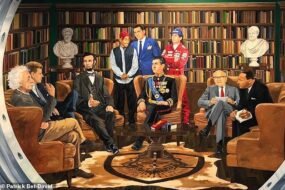
“During the First World War they [the De Morgans] were in London, so they would have been directly affected,” Jean McMeakin, Chair of the Board of Trustees of the De Morgan Foundation, tells the BBC. “Death was real for them in a way that perhaps we’ve largely forgotten these days,” she points out. “Members of William’s family died from tuberculosis, and his own health was often quite poor. Death was, in a way, always present in the background.”
More like this:
• Why this iconic 1839 painting is not what it seems
• The surprising story of Van Gogh’s guardian angel
• Nine striking, rare photos of 19th-Century America
De Morgan was a pacifist and her art became a form of activism. In Our Lady of Peace (1907), a response to the Boer Wars, a knight pleads for protection and peace, while in The Poor Man who Saved the City (1901), wisdom and diplomacy are advocated as alternatives to military intervention. Later, in The Red Cross (1914-16), angels carry the crucified Christ over a withered landscape pierced by Belgian war graves – a suggestion, perhaps, that the Christian faith is at odds with the brutality of war, but offers us hope of redemption. “You must never praise war,” De Morgan declared in The Result of an Experiment (1909), a book of “automatic writing” co-authored with her husband. “The Devil invented it, and you can have no conception of its horrors.”
Good and evil
The idea of the forces of good and evil acting upon ordinary people was pervasive at this time. “Spiritualism was quite popular,” asserts McMeakin, citing the author Sir Arthur Conan Doyle – the creator of Sherlock Holmes – as one of its most famous adherents. Other-worldly beliefs, she says, were “probably the result of the turmoil, the massive changes happening in society leading up to the turn of the century, plus a period of many wars, which would have had an impact on their view of the world”. Doubtless, De Morgan was also influenced by her mother-in-law, Sophia, a well-known spiritualist and medium. With so many lives lost, it was no doubt tempting to believe that you could reconnect with the departed.











